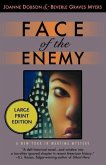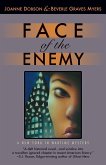Praise for The Face in the Cemetery... "This is fair warning to latch onto The Face in the Cemetery...the smart, sophisticated life we've come to love in these books is about to change." -New York Times "This series belongs in the hands of all historical mystery readers." -Booklist Egypt, 1914. The outbreak of war in Europe casts ripples even in Cairo. Gareth Owen, Mamur Zapt and Head of the Khedive's Secret Police, is given the task of rounding up enemy aliens. But determining who counts as a German proves contentious. And then there's the face in the cemetery. Who disturbed the mummified remains of cats by placing a human corpse among them? Is the villagers' talk of a mysterious Cat Woman mere superstitious nonsense, or something rather sinister? Owen has more pressing concerns in the shape of missing rifles and dubious gun-toting ghaffirs or watchmen. But the face in the cemetery refuses to go away, and Owen comes to realize that it poses questions that are not just professional but uncomfortably personal. Michael Pearce was raised in Anglo-Egyptian Sudan. He trained as a Russian interpreter but later moved to an academic career. He now lives in London and is best known as the author of the award winning Mamur Zapt books.








